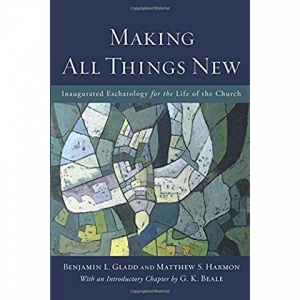This email concerns a new book being added to the library this week. It is not a book review, as I have not yet read it. But it is a book I have been eagerly awaiting since it was first announced a couple of months ago.
At this point, I just want to make some introductory comments, which are paraphrases and summaries of comments from the Preface to the book.
Making All Things New: Inaugurated Eschatology for the Life of the Church, by Benjamin L. Gladd and Matthew S. Harmon, with an Introductory Chapter by G.K. Beale (Baker Academic, 2016, 177 pages).
- In a sense, this book is an extension of the work done by G. K. Beale in his ground-breaking books such as: A New Testament Biblical Theology, The Temple and the Church’s Mission, and God Dwells Among Us: Expanding Eden to the Ends of the Earth. In this new book, the implications of those books for the church are applied to the church today.
- This book is not your ordinary eschatology book, which would deal with such issues as the rapture, tribulation, and millennium. Rather, it deals with “inaugurated eschatology”. The life, ministry, death, resurrection and ascension of Jesus ushered in the “latter days” promised in the OT, and thus the “latter days” encompass the entire time period between the first and second comings of Jesus. We are the end-time church and we live in the overlap of two ages. As Michael Bird says on the cover, “we stand in the middle of an old world dying and a new creation already born in our midst through Jesus Christ”.
- The word “inaugurated” reflects the observation that while the latter-day new-creational kingdom has begun with the work of Jesus, it has not yet been consummated in all its fullness. Another way of referring to this is to use the expression, “already-not yet”. God’s promises have found their initial fulfillment (the “already”) while still awaiting their complete and final consummation (the “not yet”).
- So the issue is: how should this be reflected in the life and ministry of the church? And that is the purpose of this book.
- The lead chapter by G.K. Beale (“The End Starts at the Beginning”) serves as a theological framework for the entire project; it is a thumbnail sketch of key portions of his A New Testament Biblical Theology.
- Whenever the subject of eschatology comes up, the continuing debate between dispensationalism and covenantalism comes up, and shows no sign of ending anytime soon. However, during the past 30 years an increasing number of scholars have searched for a middle ground, resulting in progressive dispensationalism on one end of the spectrum (Darrell Bock, Craig Blaising, Walter Kaiser, etc) and new-covenant theology or progressive covenantalism on the other (Peter Gentry and Stephen Wellum). It should be noted that one of the authors (Harmon) teaches at a dispensational school (Grace Theological Seminary) while the other (Gladd) teaches at a covenantal school ( Reformed Theological Seminary). So they believe the eschatological viewpoint they present can transcend the traditional divide between dispensationalism and covenantalism and provide not only a framework for understanding the NT, but also a foundation for the life and ministry of the church. (see footnote 1 below).
COMMENTS BY THOMAS SCHREINER:
For those who think that biblical eschatology (especially the teaching about inaugurated and consummated eschatology) doesn’t relate to daily life and ministry, Gladd and Harmon demonstrate that eschatology permeates every aspect of ministry, from prayer to preaching to missions. The book is filled with practical suggestions, but what makes it unique and powerful is that the practical implications are rooted in what the Scriptures teach about eschatology.
Ron Maness
CBC Library
FOOTNOTES:
- While it is true that inaugurated eschatology has traditionally been associated with covenant theology, Beale has previously indicated that he believes that the already-not yet framework of biblical theology can work within both progressive dispensationalism and the various forms of covenant theology. However, the authors acknowledge that it is “difficult to see how it could fit within either classical or traditional dispensationalism” (footnote, page xiii).
